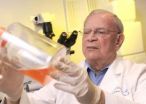(Press-News.org) Proteins are important molecules in our body and they fulfil a broad range of functions. For instance as enzymes they help to release energy from food and as muscle proteins they assist with motion. As antibodies they are involved in immune defence and as hormone receptors in signal transduction in cells. Until only recently it was assumed that all proteins take on a clearly defined three-dimensional structure – i.e. they fold in order to be able to assume these functions. Surprisingly, it has been shown that many important proteins occur as unfolded coils. Researchers seek to establish how these disordered proteins are capable at all of assuming highly complex functions.
Ben Schuler's research group from the Institute of Biochemistry of the University of Zurich has now established that an increase in temperature leads to folded proteins collapsing and becoming smaller. Other environmental factors can trigger the same effect. The crowded environments inside cells lead to the proteins shrinking. As these proteins interact with other molecules in the body and bring other proteins together, understanding of these processes is essential "as they play a major role in many processes in our body, for instance in the onset of cancer", comments study coordinator Ben Schuler.
Measurements using the "molecular ruler"
"The fact that unfolded proteins shrink at higher temperatures is an indication that cell water does indeed play an important role as to the spatial organisation eventually adopted by the molecules", comments Schuler with regard to the impact of temperature on protein structure. For their studies the biophysicists use what is known as single-molecule spectroscopy. Small colour probes in the protein enable the observation of changes with an accuracy of more than one millionth of a millimetre. With this "molecular yardstick" it is possible to measure how molecular forces impact protein structure.
With computer simulations the researchers have mimicked the behaviour of disordered proteins. They want to use them in future for more accurate predictions of their properties and functions.
Correcting test tube results
That's why it's important, according to Schuler, to monitor the proteins not only in the test tube but also in the organism. "This takes into account the fact that it is very crowded on the molecular level in our body as enormous numbers of biomolecules are crammed into a very small space in our cells", says Schuler. The biochemists have mimicked this "molecular crowding" and observed that in this environment disordered proteins shrink, too.
Given these results many experiments may have to be revisited as the spatial organisation of the molecules in the organism could differ considerably from that in the test tube according to the biochemist from the University of Zurich. "We have, therefore, developed a theoretical analytical method to predict the effects of molecular crowding." In a next step the researchers plan to apply these findings to measurements taken directly in living cells.
INFORMATION:
Further reading:
Andrea Soranno, Iwo Koenig, Madeleine B. Borgia, Hagen Hofmann, Franziska Zosel, Daniel Nettels, and Benjamin Schuler. Single-molecule spectroscopy reveals polymer effects of disordered proteins in crowded environments. PNAS, March 2014. doi:10.1073/pnas.1322611111
René Wuttke, Hagen Hofmann, Daniel Nettels, Madeleine B. Borgia, Jeetain Mittal, Robert B. Best and Benjamin Schuler. Temperature-dependent solvation modulates the dimensions of disordered proteins. PNAS, March 2014. doi:10.1073/pnas.1313006111
Contacts:
Prof. Benjamin Schuler
Department of Biochemistry
University of Zurich
Tel. +41 44 635 55 35
Email: schuler@bioc.uzh.ch
Unfolded proteins collapse when exposed to heat and crowded environments
2014-03-24
ELSE PRESS RELEASES FROM THIS DATE:
Diabetes drug shows promise in reducing Alzheimer's disease in an experimental model
2014-03-24
(Boston) Researchers from Boston University School of Medicine (BUSM) have found that the diabetic drug, pramlintide, reduces amyloid-beta peptides, a major component of Alzheimer's disease (AD) in the brain and improves learning and memory in two experimental AD models. These findings, which appear online in Molecular Psychiatry, also found AD patients have a lower level of amylin in blood compared to those without this disease. These results may provide a new avenue for both treatment and diagnosis of AD.
AD is a degenerative brain disease associated with severe functional ...
Fair bosses pay a price
2014-03-24
EAST LANSING, Mich. — Bosses who are fair make their workers happier and their companies more productive, but in the end may be burning themselves out.
A new study led by Michigan State University's Russell E. Johnson found the act of carefully monitoring the fairness of workplace decisions wears down supervisors mentally and emotionally.
"Structured, rule-bound fairness, known as procedural justice, is a double-edged sword for managers," said Johnson, assistant professor of management. "While beneficial for their employees and the organization, it's an especially draining ...
The unconscious mind can detect a liar -- even when the conscious mind fails
2014-03-24
When it comes to detecting deceit, your automatic associations may be more accurate than conscious thought in pegging truth-tellers and liars, according to research published in Psychological Science, a journal of the Association for Psychological Science.
The findings suggest that conscious awareness may hinder our ability to detect whether someone is lying, perhaps because we tend to seek out behaviors that are supposedly stereotypical of liars, like averted eyes or fidgeting. But those behaviors may not be all that indicative of an untrustworthy person.
"Our research ...
Leaders are wired to be task-focused or team-builders, but can be both
2014-03-24
What sort of leader are you? Do you think leading is all about a laser-like focus on the task, watching the bottom line and making sure everyone is doing what they should? Or is it about listening to your team, being open to ideas and perspectives, and inspiring them to find their own niche?
Distinctions between a task-oriented leader and a social-emotional leader have filled the pages of academic literature for more than a half-century. But recent research strongly suggests the distinction has a foundation in our brains—which allows us to be either analytical or empathetic, ...
Want to survive the zombie apocalypse? This 'cologne' could be the key (video)
2014-03-24
WASHINGTON, March 24, 2014 — If you believe the doomsayers, a zombie apocalypse is coming, and you need to be prepared. On AMC's The Walking Dead, whose season finale airs Sunday, survivors are always worried about running out of bullets, arrows or even sharp sticks. But what if chemistry could help you get away from the flesh eaters? In the American Chemical Society's (ACS') latest Reactions video, we talk with chemist Raychelle Burks, Ph.D., who shares her recipe for a "death cologne" that might someday save you from the undead. The video is available at http://www.youtube.com/watch?v=SUEjmyisz7c.
INFORMATION:
Subscribe ...
Gene expression signature reveals new way to classify gum disease
2014-03-24
NEW YORK, NY (March 21, 2014) — Researchers at Columbia University Medical Center (CUMC) have devised a new system for classifying periodontal disease based on the genetic signature of affected tissue, rather than on clinical signs and symptoms. The new classification system, the first of its kind, may allow for earlier detection and more individualized treatment of severe periodontitis, before loss of teeth and supportive bone occurs. The findings were published recently in the online edition of the Journal of Dental Research.
Currently, periodontal disease is classified ...
Inherited mutated gene raises lung cancer risk for women, those who never smoked
2014-03-24
DALLAS – March 21, 2014 – People who have an inherited mutation of a certain gene have a high chance of getting lung cancer — higher, even, than heavy smokers with or without the inherited mutation, according to new findings by cancer researchers at UT Southwestern Medical Center. Although both genders have an equal risk of inheriting the mutation, those who develop lung cancer are mostly women and have never smoked, the researchers found.
People with the rare inherited T790M mutation of the epidermal growth factor receptor (EGFR) gene who have never smoked have a one-in-three ...
Researcher: Study on element could change ballgame on radioactive waste
2014-03-24
TALLAHASSEE, Fla. — Groundbreaking work by a team of chemists on a fringe element of the periodic table could change how the world stores radioactive waste and recycles fuel.
The element is called californium — Cf if you're looking at the Periodic Table of Elements — and it's what Florida State Professor Thomas Albrecht-Schmitt, the lead researcher on the project, calls "wicked stuff."
In carefully choreographed experiments, Albrecht-Schmitt and his colleagues found that californium had amazing abilities to bond and separate other materials. They also found it was extremely ...
Nasal spray delivers new type of depression treatment
2014-03-24
(Toronto) March 24, 2014 – A nasal spray that delivers a peptide to treat depression holds promise as a potential alternative therapeutic approach, research from the Centre for Addiction and Mental Health (CAMH) shows.
The study, led by CAMH's Dr. Fang Liu, is published online in Neuropsychopharmacology.
In a previous study published in Nature Medicine in 2010, Dr. Liu developed a protein peptide that provided a highly targeted approach to treating depression that she hopes will have minimal side effects. The peptide was just as effective in relieving symptoms when ...
Life hots up for British birds
2014-03-24
Climate change may be bad news for billions, but scientists at the University of Sheffield have discovered one unlikely winner – a tiny British bird, the long-tailed tit.
Like other small animals that live for only two or three years, these birds had until now been thought to die in large numbers during cold winters. But new research suggests that warm weather during spring instead holds the key to their survival.
The findings come from a 20-year study of long-tailed tits run by Professor Ben Hatchwell at the Department of Animal and Plant Sciences. The recent work ...




